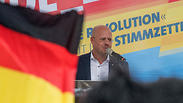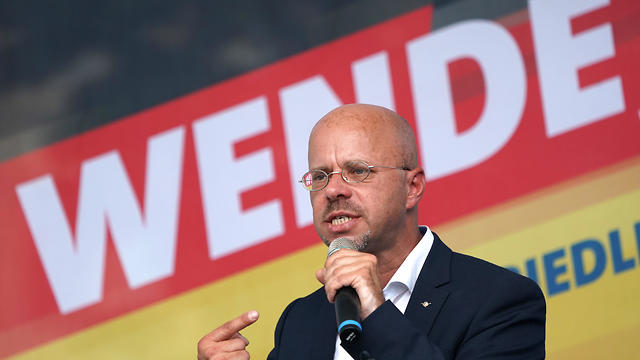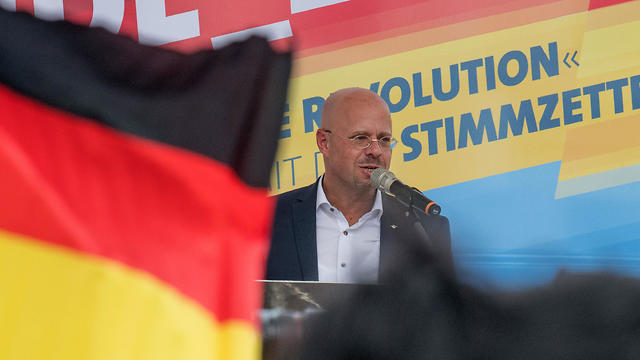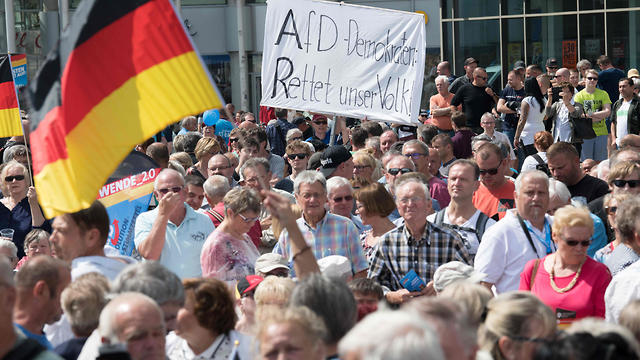
Andreas Kalbitz
Photo: AFP
Top of the polls, German politician downplays far-right past
Andreas Kalbitz who heads the anti-migrant Alternative for Germany party - predicted to get 21% of the vote in the elections - in the past downplayed the Holocaust and was a member of the Witiko Association, which was founded by former Nazis after World War II
A quarter century after first dipping his toes in Germany's far-right waters, Andreas Kalbitz is sailing them to one of the political faction's bigger triumphs.
Kalbitz, 46, could be the big winner in next month's state elections in Brandenburg, where he heads the anti-migrant Alternative for Germany party. He also is under scrutiny for far-right involvement dating back to the early 1990s, when Germany saw a resurgence of nationalist sentiment amid post-unification turmoil.
"One could accuse me of right-wing extremist connections, but certainly not of having (a) far-right extremist biography," Kalbitz told reporters Tuesday in Berlin.
Critics allege the disavowal is patently false. They point to Kalbitz having joined the Republikaner, a fringe far-right party that was under surveillance by Germany's domestic security agency, when he was 21.
Around the same time, he also became a member of the Witiko Association, which was founded by former Nazis after World War II. German authorities say its activities in recent decades included downplaying the Holocaust and pushing a revisionist interpretation of the war.
Gideon Botsch, a political scientist at the University of Potsdam, said Kalbitz "very clearly over long periods of his life, basically since he was a youth, was rooted in the right-wing extremist scene."
Botsch noted that Kalbitz was photographed in 2007 at an event hosted by the HDJ, a neo-Nazi youth movement that's since been banned. Until recently, Kalbitz also was a leading member of the Archive of History, an association founded by a former member of the Waffen-SS.
Kalbitz argued Tuesday that his past shouldn't be held against him.
Asked about an article he wrote in 2001 which suggested Germans faced "ethnocide" due to immigration, he replied, "it's a choice of words I wouldn't pick (anymore). That's an issue I've checked off."
Kalbitz, a former paratrooper, also downplayed his involvement in two films, one about Adolf Hitler as a soldier in World War I and another about the 1. Gebirgsdivision, a World War II army mountain division that participated in numerous atrocities.
Experts have described both as glossing over historical facts.
Until recently, Kalbitz remained largely below the radar of national political attention, in Germany.
He is considered close to Bjoern Hoecke, Alternative for Germany's firebrand leader in Thuringia state. Hoecke has called for Germany to change the way it remembers and atones for its Nazi past.
Earlier this year Germany's domestic security agency said it was stepping up surveillance of Hoecke's faction within the party, known as The Wing.
Kalbitz said he hopes that a strong result in Brandenburg, Saxony and Thuringia this year will "send a signal nationwide" that Alternative for Germany can win elections.
One of Alternative for Germany's few distinct policies in Brandenburg, a large but sparsely populated state of 2.5 million that encircles Berlin, is to offer each family a 25,000-euro loan ($28,000), with 5,000 euros ($5,600) of debt erased per child born.
A poll published Friday by daily newspaper Maerkische Allgemeine daily predicted that Alternative for Germany, or AfD, would get 21% of the state vote in Brandenburg on September 1.
The survey, which had a margin of error of 3 percentage points, put the governing Social Democrats at 17%, behind Chancellor Angela Merkel's Christian Democratic Union party with 18%.
The other parties say they will not form a coalition with Alternative for Germany. But the party's strength will likely complicate the formation of the next Brandenburg state government by forcing at least three other parties to band together.
"It will expand its share of the vote, that much is certain," political scientist Botsch said. "It stands a good chance of becoming the strongest party, but it's far from getting a majority in society or being able to form a coalition."
Nevertheless, the party's attacks against migrants have already had caused subtle shifts, according to Botsch. Police and news media in Brandenburg have taken to always naming a suspect's nationality in crime reports, something that's normally frowned on in Germany, he noted.
Speaking at an election rally last year, Kalbitz said if Alternative for Germany party came to power "it won't be Germans who cross to the other side of the road when hordes of young refugees walk toward them, followed by that squadron of headscarves with their double - and triple-seater strollers."
Asked about the remarks on Tuesday, Kalbitz said he was trying to "describe in a pithy election campaign fashion the feeling of unease that many people have now because some of the so-called refugees - not all of them, I don't generalize - it just feels threatening."
"There are Muslims who abide by the law, that pay their taxes, that are integrated, that speak our language and they belong to Germany too," he added.













